Burt A. The Evolution of the British Empire and Commonwealth From the American Revolution
Подождите немного. Документ загружается.

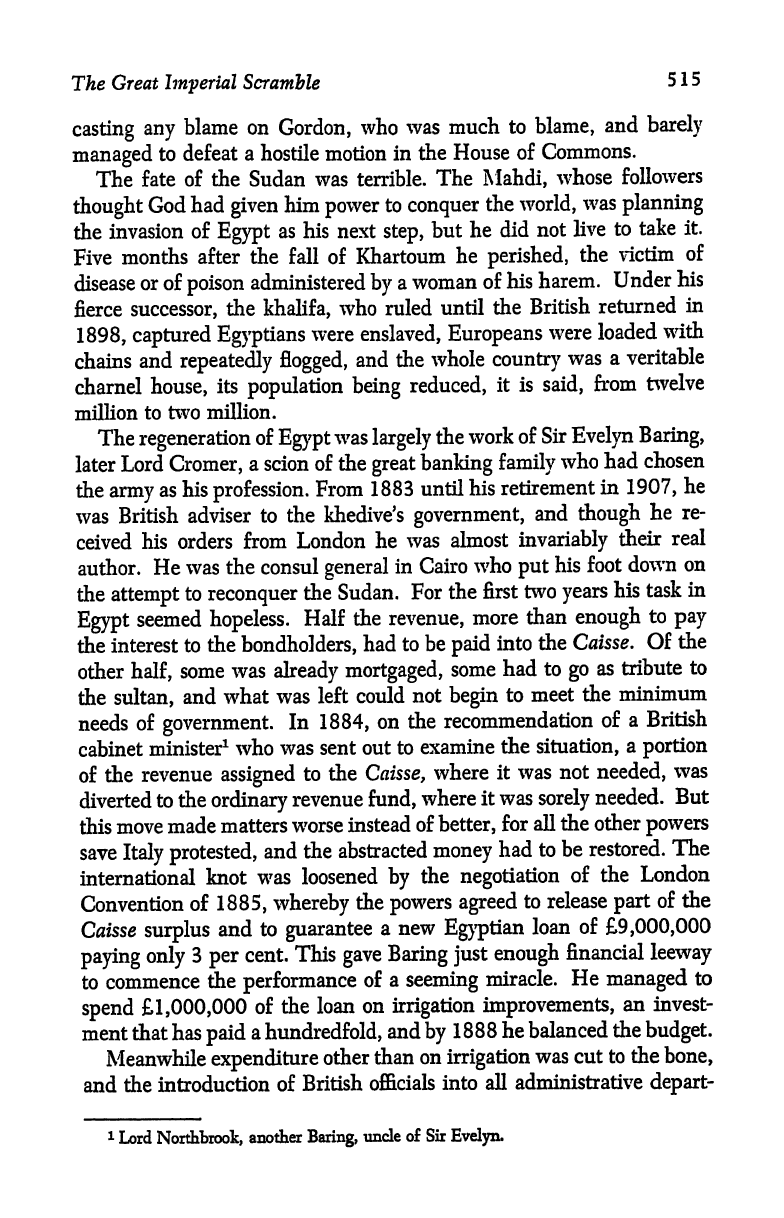
The
Great
Imperial
Scramble
515
casting
any
blame
on
Gordon,
who
was
much to
blame,
and
barely
managed
to
defeat
a
hostile motion
in
the
House
of
Commons.
The
fate
of the
Sudan
was terrible.
The
Mahdi,
whose
followers
thought
God
had
given
him
power
to
conquer
the
world,
was
planning
the
invasion
of
Egypt
as his next
step,
but
he
did
not
live
to
take
it.
Five
months
after
the fall
of
Khartoum
he
perished,
the
victim
of
disease
or of
poison
administered
by
a
woman
of
his harem.
Under
his
fierce
successor,
the
khalifa,
who
ruled
until
the
British
returned
in
1898,
captured
Egyptians
were
enslaved,
Europeans
were loaded
with
chains
and
repeatedly
flogged,
and the
whole
country
was
a
veritable
charnel
house,
its
population being
reduced,
it is
said,
from
twelve
million
to
two million.
The
regeneration
of
Egypt
was
largely
the
work
of
Sir
Evelyn
Baring,
later
Lord
Cromer,
a scion
of the
great
banking
family
who
had
chosen
the
army
as
his
profession.
From
1883
until
his
retirement
in
1907,
he
was
British
adviser to
the
khedive's
government,
and
though
he
re-
ceived
his orders from
London
he
was
almost
invariably
their
real
author.
He
was
the
consul
general
in
Cairo
who
put
his
foot
down
on
the
attempt
to
reconquer
the
Sudan.
For
the
first
two
years
his
task
in
Egypt
seemed
hopeless.
Half
the
revenue,
more
than
enough
to
pay
the
interest
to
the
bondholders,
had
to be
paid
into
the
Caisse.
Of
the
other
half,
some
was
already mortgaged,
some
had to
go
as
tribute
to
the
sultan,
and
what
was
left
could
not
begin
to
meet
the
minimum
needs
of
government.
In
1884,
on
the
recommendation
of
a British
cabinet
minister
1
who
was
sent
out to
examine
the
situation,
a
portion
of
the
revenue
assigned
to
the
Caisse,
where
it was
not
needed,
was
diverted
to
the
ordinary
revenue
fund,
where
it was
sorely
needed.
But
this
move
made
matters
worse
instead
of
better,
for
all
the other
powers
save
Italy protested,
and the abstracted
money
had to
be
restored.
The
international
knot
was loosened
by
the
negotiation
of
the
London
Convention
of
1885,
whereby
the
powers
agreed
to
release
part
of
the
Caisse
surplus
and
to
guarantee
a
new
Egyptian
loan
of
9,000,000
paying
only
3
per
cent.
This
gave
Baring
just
enough
financial
leeway
to commence
the
performance
of
a
seeming
miracle.
He
managed
to
spend
1,000,000
of
the loan
on
irrigation
improvements,
an invest-
ment
that has
paid
a
hundredfold,
and
by
1888
he
balanced
the
budget.
Meanwhile
expenditure
other
than
on
irrigation
was cut
to the
bone,
and the
introduction
of
British
officials
into all
administrative
depart-
1
Lord
Northbrook,
another
Baring,
uncle
of Sir
Evelyn.
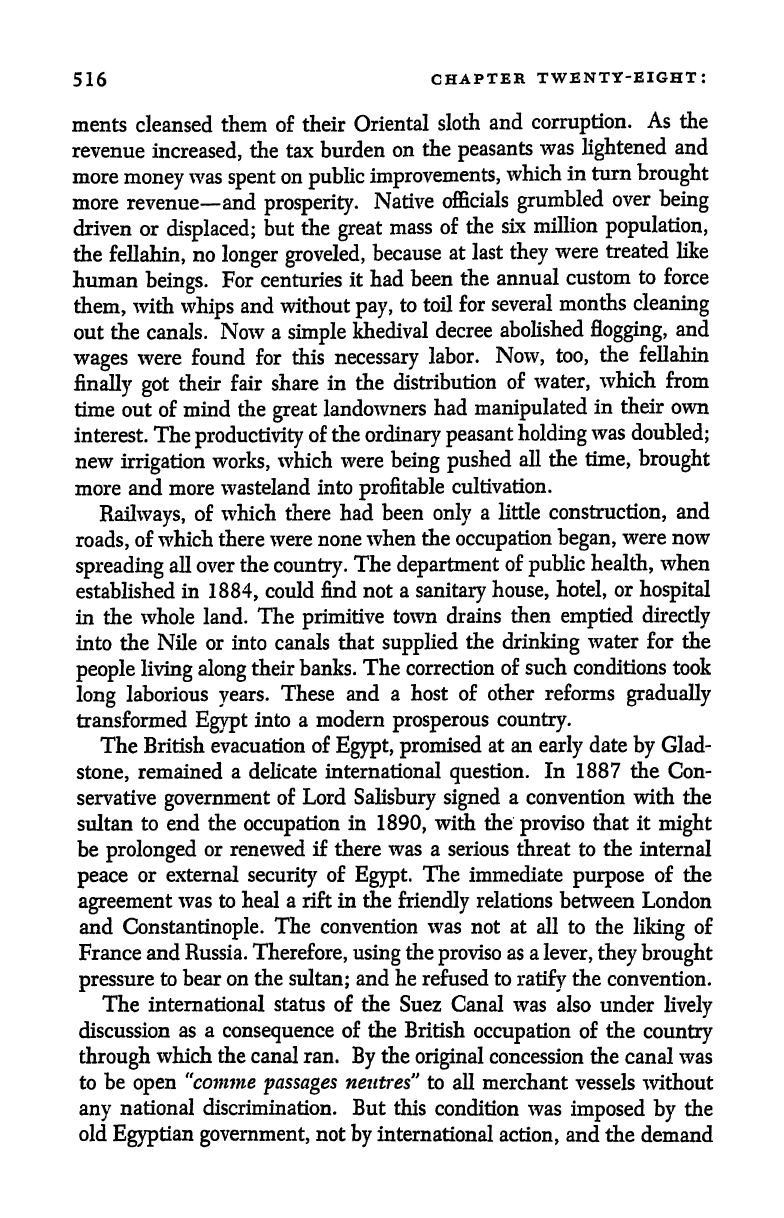
516
CHAPTER
TWENTY-EIGHT:
ments
cleansed
them of
their Oriental
sloth
and
corruption.
As
the
revenue
increased,
the tax
burden
on
the
peasants
was
lightened
and
more
money
was
spent
on
public
improvements,
which
in turn
brought
more
revenue
and
prosperity.
Native
officials
grumbled
over
being
driven or
displaced;
but
the
great
mass
of
the
six
million
population,
the
fellahin,
no
longer
groveled,
because
at
last
they
were
treated
like
human
beings.
For
centuries
it
had
been
the
annual
custom
to
force
them,
with
whips
and without
pay,
to toil
for
several
months
cleaning
out
the
canals.
Now
a
simple
khedival
decree
abolished
flogging,
and
wages
were found
for this
necessary
labor.
Now,
too,
the
fellahin
finally
got
their
fair
share
in
the
distribution
of
water,
which
from
time out of
mind the
great
landowners
had
manipulated
in
their
own
interest. The
productivity
of
the
ordinary
peasant
holding
was
doubled;
new
irrigation
works,
which
were
being pushed
all the
time,
brought
more and
more
wasteland
into
profitable
cultivation.
Railways,
of
which
there had
been
only
a little
construction,
and
roads,
of
which there
were none
when
the
occupation
began,
were
now
spreading
all
over
the
country.
The
department
of
public
health,
when
established
in
1884,
could
find
not
a
sanitary
house,
hotel,
or
hospital
in
the whole
land.
The
primitive
town
drains
then
emptied directly
into the
Nile
or
into
canals
that
supplied
the
drinking
water
for the
people
living along
their banks.
The correction
of
such
conditions took
long
laborious
years.
These
and
a host of
other reforms
gradually
transformed
Egypt
into
a modern
prosperous
country.
The
British
evacuation
of
Egypt,
promised
at
an
early
date
by
Glad-
stone,
remained
a
delicate international
question.
In 1887 the
Con-
servative
government
of
Lord
Salisbury
signed
a convention with
the
sultan
to
end
the
occupation
in
1890,
with the
proviso
that
it
might
be
prolonged
or
renewed
if there was a serious threat
to
the
internal
peace
or external
security
of
Egypt.
The immediate
purpose
of the
agreement
was to heal
a
rift
in
the
friendly
relations between
London
and
Constantinople.
The convention
was
not at
all
to the
liking
of
France and
Russia.
Therefore,
using
the
proviso
as
a
lever,
they brought
pressure
to
bear on the
sultan;
and he refused to
ratify
the
convention.
The
international
status
of the Suez
Canal was
also
under
lively
discussion
as
a
consequence
of
the British
occupation
of
the
country
through
which the canal ran.
By
the
original
concession the canal was
to
be
open
"comme
passages
neutres"
to
all
merchant
vessels without
any
national discrimination. But
this
condition was
imposed
by
the
old
Egyptian government,
not
by
international
action,
and the demand
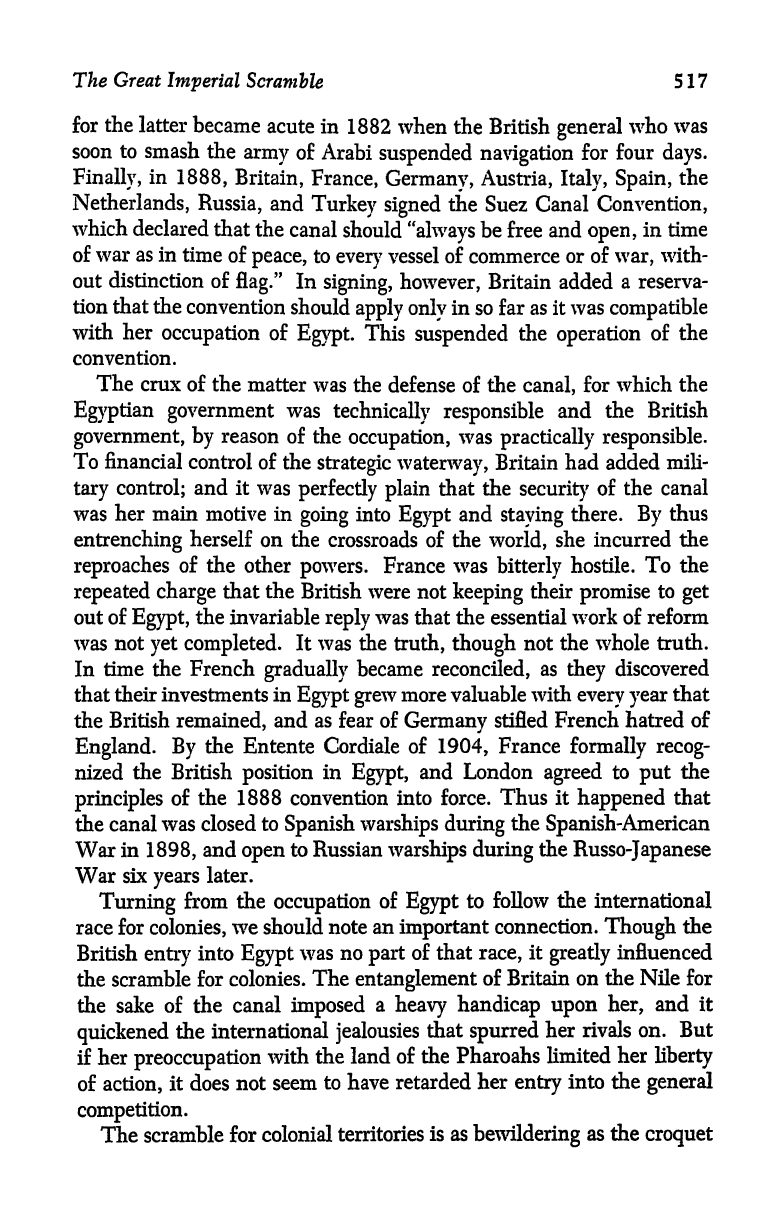
The
Great
Imperial
Scramble
517
for
the
latter
became
acute
in
1882 when
the
British
general
who
was
soon
to smash
the
army
of Arabi
suspended
navigation
for
four
days.
Finally,
in
1888,
Britain,
France,
Germany,
Austria,
Italy,
Spain,
the
Netherlands,
Russia,
and
Turkey
signed
the Suez
Canal
Convention,
which
declared
that
the
canal
should
"always
be free
and
open,
in
time
of
war
as in
time
of
peace,
to
every
vessel
of
commerce
or of
war,
with-
out
distinction of
flag."
In
signing,
however,
Britain added
a reserva-
tion that
the
convention
should
apply only
in
so far
as it
was
compatible
with
her
occupation
of
Egypt.
This
suspended
the
operation
of
the
convention.
The crux
of
the
matter
was the
defense of
the
canal,
for
which
the
Egyptian
government
was
technically
responsible
and
the
British
government,
by
reason
of
the
occupation,
was
practically
responsible.
To
financial
control of the
strategic
waterway,
Britain
had
added
mili-
tary
control;
and
it
was
perfectly
plain
that
the
security
of
the canal
was
her
main
motive
in
going
into
Egypt
and
staying
there.
By
thus
entrenching
herself
on
the
crossroads of the
world,
she incurred
the
reproaches
of
the other
powers.
France was
bitterly
hostile.
To
the
repeated
charge
that
the
British
were
not
keeping
their
promise
to
get
out
of
Egypt,
the
invariable
reply
was
that the essential work
of
reform
was
not
yet completed.
It was
the
truth,
though
not the whole
truth.
In
time
the
French
gradually
became
reconciled,
as
they
discovered
that
their
investments
in
Egypt grew
more valuable
with
every
year
that
the
British
remained,
and
as
fear of
Germany
stifled French hatred
of
England.
By
the
Entente Cordiale
of
1904,
France
formally
recog-
nized
the British
position
in
Egypt,
and
London
agreed
to
put
the
principles
of
the 1888
convention
into force.
Thus it
happened
that
the
canal
was closed
to
Spanish warships during
the
Spanish-American
War
in
1898,
and
open
to Russian
warships
during
the
Russo-Japanese
War
six
years
later.
Turning
from
the
occupation
of
Egypt
to
follow
the
international
race for
colonies,
we should note
an
important
connection.
Though
the
British
entry
into
Egypt
was no
part
of that
race,
it
greatly
influenced
the
scramble
for
colonies.
The
entanglement
of Britain on
the
Nile
for
the
sake
of
the
canal
imposed
a
heavy
handicap upon
her,
and
it
quickened
the
international
jealousies
that
spurred
her
rivals
on. But
if her
preoccupation
with the
land of the
Pharoahs limited
her
liberty
of
action,
it
does
not seem
to have
retarded
her
entry
into
the
general
competition.
The scramble
for
colonial
territories
is
as
bewildering
as the
croquet
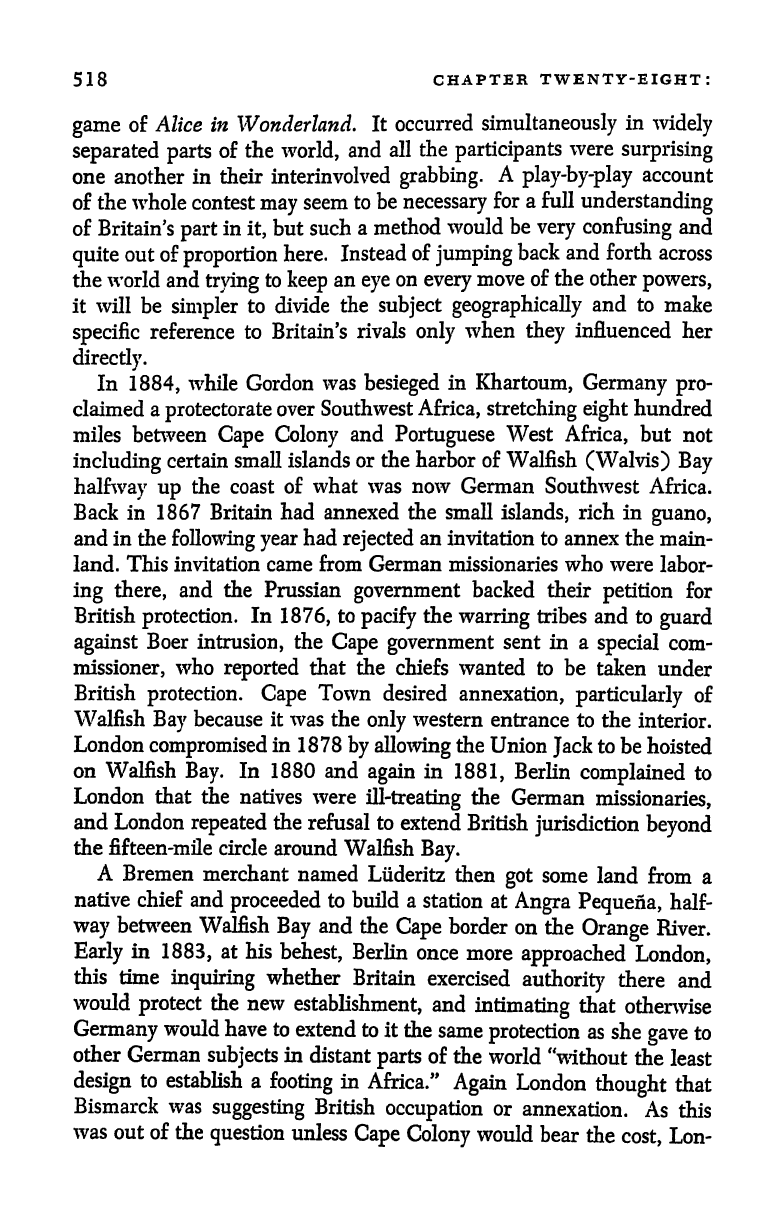
518
CHAPTER
TWENTY-EIGHT:
game
of
Alice in
Wonderland.
It
occurred
simultaneously
in
widely
separated
parts
of
the
world,
and
all
the
participants
were
surprising
one
another
in their
interinvolved
grabbing.
A
play-by-play
account
of the
whole
contest
may
seem
to
be
necessary
for
a full
understanding
of
Britain's
part
in
it,
but such
a method
would
be
very
confusing
and
quite
out
of
proportion
here. Instead
of
jumping
back
and
forth
across
the world and
trying
to
keep
an
eye
on
every
move of
the
other
powers,
it
will be
simpler
to
divide
the
subject geographically
and
to
make
specific
reference
to Britain's
rivals
only
when
they
influenced
her
directly.
In
1884,
while
Gordon
was
besieged
in
Khartoum,
Germany
pro-
claimed a
protectorate
over
Southwest
Africa,
stretching
eight
hundred
miles between
Cape
Colony
and
Portuguese
West
Africa,
but
not
including
certain small
islands
or
the
harbor of Walfish
(Walvis)
Bay
halfway
up
the coast of
what was now
German Southwest
Africa.
Back
in 1867 Britain had
annexed the small
islands,
rich
in
guano,
and
in
the
following
year
had
rejected
an
invitation to
annex
the
main-
land.
This invitation
came from
German missionaries
who
were
labor-
ing
there,
and
the Prussian
government
backed their
petition
for
British
protection.
In
1876,
to
pacify
the
warring
tribes
and
to
guard
against
Boer
intrusion,
the
Cape
government
sent in
a
special
com-
missioner,
who
reported
that
the
chiefs wanted to be
taken
under
British
protection. Cape
Town
desired
annexation,
particularly
of
Walfish
Bay
because
it
was
the
only
western
entrance
to
the
interior.
London
compromised
in
1878
by
allowing
the
Union
Jack
to
be
hoisted
on Walfish
Bay.
In 1880
and
again
in
1881,
Berlin
complained
to
London that the
natives were
ill-treating
the
German
missionaries,
and London
repeated
the
refusal to
extend
British
jurisdiction
beyond
the
fifteen-mile
circle
around Walfish
Bay.
A
Bremen
merchant
named
Liideritz
then
got
some
land
from
a
native chief
and
proceeded
to build a
station
at
Angra
Pequena,
half-
way
between
Walfish
Bay
and
the
Cape
border
on
the
Orange
River.
Early
in
1883,
at his
behest,
Berlin
once
more
approached
London,
this
time
inquiring
whether
Britain
exercised
authority
there
and
would
protect
the new
establishment,
and
intimating
that
otherwise
Germany
would have
to
extend
to it
the
same
protection
as
she
gave
to
other German
subjects
in
distant
parts
of
the
world
"without
the
least
design
to
establish
a
footing
in
Africa."
Again
London
thought
that
Bismarck
was
suggesting
British
occupation
or
annexation.
As
this
was
out of
the
question
unless
Cape
Colony
would
bear
the
cost,
Lon-
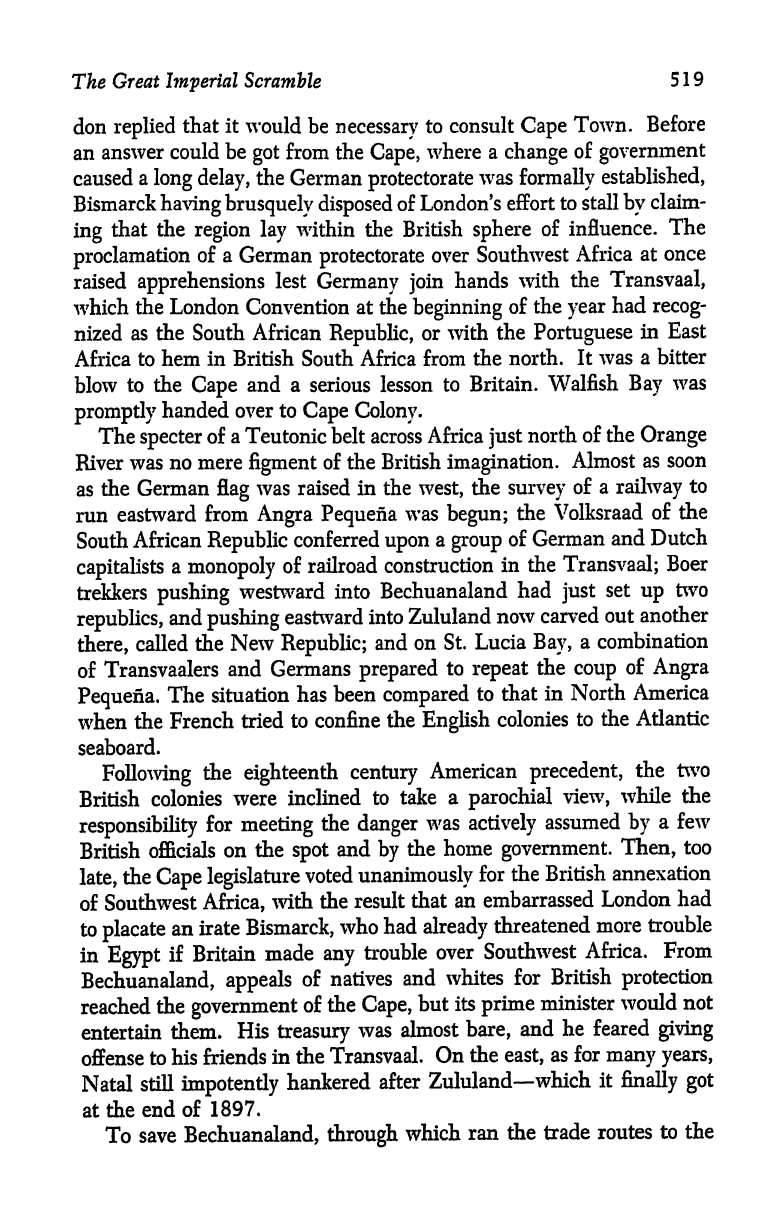
The
Great
Imperial
Scramble
5
1 9
don
replied
that it
would
be
necessary
to
consult
Cape
Town.
Before
an
answer
could be
got
from
the
Cape,
where a
change
of
government
caused
a
long
delay,
the
German
protectorate
was
formally
established,
Bismarck
having brusquely disposed
of London's
effort
to stall
by
claim-
ing
that
the
region lay
within the British
sphere
of
influence.
The
proclamation
of
a
German
protectorate
over
Southwest
Africa at
once
raised
apprehensions
lest
Germany join
hands
with
the
Transvaal,
which
the London
Convention
at the
beginning
of
the
year
had
recog-
nized
as the South African
Republic,
or
with the
Portuguese
in
East
Africa
to
hem
in British
South
Africa
from
the
north.
It
was
a
bitter
blow
to
the
Cape
and a
serious lesson
to
Britain.
Walfish
Bay
was
promptly
handed
over
to
Cape Colony.
The
specter
of
a
Teutonic
belt across Africa
just
north
of the
Orange
River
was no
mere
figment
of the
British
imagination.
Almost
as
soon
as
the German
flag
was
raised in
the
west,
the
survey
of
a
railway
to
run
eastward
from
Angra
Pequena
was
begun;
the
Volksraad
of
the
South
African
Republic
conferred
upon
a
group
of German
and Dutch
capitalists
a
monopoly
of
railroad
construction
in
the
Transvaal;
Boer
trekkers
pushing
westward into
Bechuanaland
had
just
set
up
two
republics,
and
pushing
eastward
into Zululand
now
carved
out
another
there,
called
the New
Republic;
and on
St.
Lucia
Bay,
a combination
of
Transvaalers
and Germans
prepared
to
repeat
the
coup
of
Angra
Pequena.
The situation
has
been
compared
to
that
in North
America
when
the
French
tried
to confine
the
English
colonies
to
the Atlantic
seaboard.
Following
the
eighteenth
century
American
precedent,
the
two
British
colonies
were
inclined
to
take
a
parochial
view,
while the
responsibility
for
meeting
the
danger
was
actively
assumed
by
a few
British
officials
on
the
spot
and
by
the
home
government.
Then,
too
late,
the
Cape
legislature
voted
unanimously
for
the British
annexation
of
Southwest
Africa,
with the
result
that
an embarrassed
London
had
to
placate
an
irate
Bismarck,
who
had
already
threatened
more
trouble
in
Egypt
if
Britain
made
any
trouble
over Southwest
Africa. From
Bechuanaland,
appeals
of
natives
and
whites
for
British
protection
reached
the
government
of
the
Cape,
but
its
prime
minister would
not
entertain
them.
His
treasury
was almost
bare,
and
he feared
giving
offense
to
his
friends
in the
Transvaal.
On
the
east,
as for
many years,
Natal
still
impotently
hankered
after
Zululand
which
it
finally
got
at
the
end
of
1897.
To
save
Bechuanaland,
through
which
ran the
trade
routes
to
the
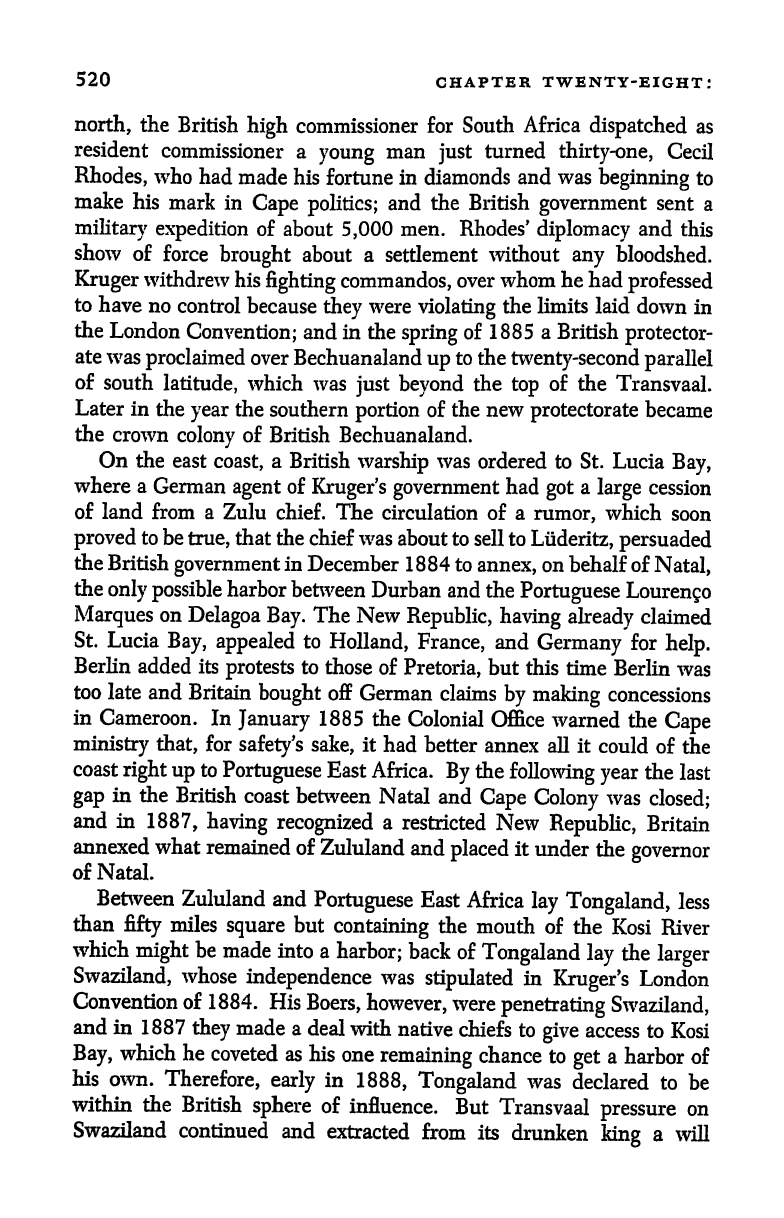
520
CHAPTER
TWENTY-EIGHT:
north,
the
British
high
commissioner
for
South
Africa
dispatched
as
resident
commissioner
a
young
man
just
turned
thirty-one,
Cecil
Rhodes,
who
had
made his
fortune
in
diamonds
and was
beginning
to
make
his
mark
in
Cape
politics;
and the
British
government
sent
a
military
expedition
of
about
5,000
men. Rhodes'
diplomacy
and
this
show
of
force
brought
about a
settlement
without
any
bloodshed.
Kruger
withdrew his
fighting
commandos,
over
whom he
had
professed
to
have
no
control because
they
were
violating
the limits laid
down in
the
London
Convention;
and
in
the
spring
of
1885 a British
protector-
ate
was
proclaimed
over
Bechuanaland
up
to the
twenty-second
parallel
of
south
latitude,
which was
just
beyond
the
top
of the
Transvaal.
Later
in
the
year
the
southern
portion
of the
new
protectorate
became
the
crown
colony
of British Bechuanaland.
On
the
east
coast,
a
British
warship
was
ordered to St. Lucia
Bay,
where
a
German
agent
of
Kruger's
government
had
got
a
large
cession
of land
from
a
Zulu
chief. The
circulation of a
rumor,
which
soon
proved
to be
true,
that the
chief was
about to
sell
to
Luderitz,
persuaded
the
British
government
in
December 1884
to
annex,
on behalf of
Natal,
the
only
possible
harbor
between
Durban and
the
Portuguese
Lourengo
Marques
on
Delagoa Bay.
The New
Republic,
having
already
claimed
St.
Lucia
Bay,
appealed
to
Holland,
France,
and
Germany
for
help.
Berlin
added
its
protests
to
those of
Pretoria,
but this
time
Berlin
was
too late
and Britain
bought
off German
claims
by
making
concessions
in
Cameroon.
In
January
1885 the
Colonial Office
warned the
Cape
ministry
that,
for
safety's
sake,
it
had better
annex
all it
could
of
the
coast
right up
to
Portuguese
East
Africa.
By
the f
ollowing year
the
last
gap
in the
British
coast between
Natal
and
Cape
Colony
was
closed;
and in
1887,
having
recognized
a
restricted New
Republic,
Britain
annexed what
remained of
Zululand
and
placed
it
under
the
governor
of
Natal.
Between
Zululand
and
Portuguese
East
Africa
lay
Tongaland,
less
than
fifty
miles
square
but
containing
the
mouth
of
the
Kosi
River
which
might
be
made
into a
harbor;
back
of
Tongaland
lay
the
larger
Swaziland,
whose
independence
was
stipulated
in
Kruger's
London
Convention
of
1884.
His
Boers,
however,
were
penetrating
Swaziland,
and in 1887
they
made a
deal with
native
chiefs
to
give
access
to Kosi
Bay,
which
he
coveted as
his
one
remaining
chance
to
get
a
harbor of
his own.
Therefore,
early
in
1888,
Tongaland
was
declared to
be
within
the
British
sphere
of
influence.
But
Transvaal
pressure
on
Swaziland
continued
and
extracted
from
its
drunken
king
a
will
o
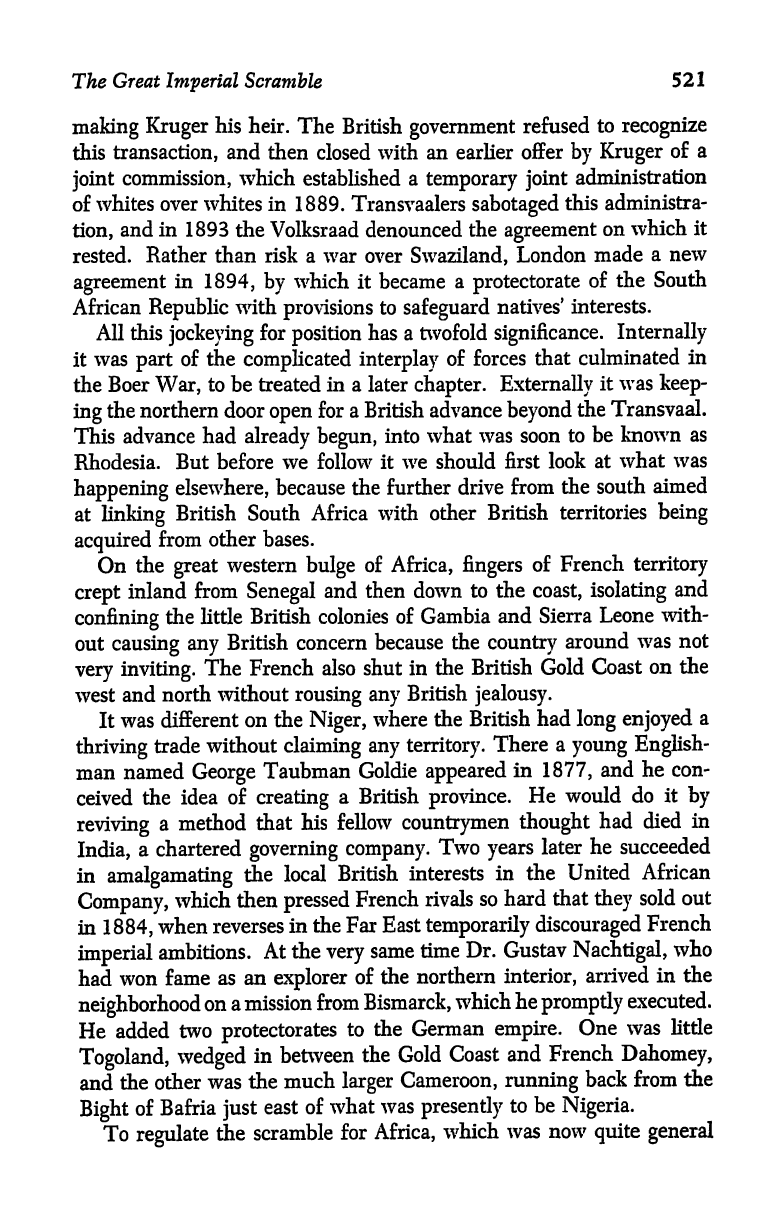
The
Great
Imperial
Scramble
521
making Kruger
his
heir.
The
British
government
refused
to
recognize
this
transaction,
and then
closed with
an earlier offer
by
Kruger
of
a
joint
commission,
which
established
a
temporary
joint
administration
of
whites over
whites
in 1889. Transvaalers
sabotaged
this administra-
tion,
and in 1893
the Volksraad
denounced
the
agreement
on
which
it
rested.
Rather
than
risk
a war
over
Swaziland,
London
made
a new
agreement
in
1894,
by
which it became
a
protectorate
of
the South
African
Republic
with
provisions
to
safeguard
natives'
interests.
All this
jockeying
for
position
has a twofold
significance.
Internally
it
was
part
of
the
complicated interplay
of
forces
that
culminated
in
the
Boer
War,
to be treated
in
a later
chapter.
Externally
it was
keep-
ing
the northern door
open
for
a British advance
beyond
the Transvaal.
This
advance had
already begun,
into
what
was soon
to
be known
as
Rhodesia.
But before we follow
it we should
first
look
at
what
was
happening
elsewhere,
because the
further drive
from
the south
aimed
at
linking
British South Africa
with other
British
territories
being
acquired
from
other
bases.
On
the
great
western
bulge
of
Africa,
fingers
of
French
territory
crept
inland
from
Senegal
and
then down
to the
coast,
isolating
and
confining
the little
British
colonies
of
Gambia
and Sierra
Leone
with-
out
causing
any
British concern because
the
country
around
was not
very
inviting.
The
French also
shut in
the
British Gold
Coast
on the
west
and north
without
rousing
any
British
jealousy.
It
was different
on the
Niger,
where
the
British had
long
enjoyed
a
thriving
trade
without
claiming
any
territory.
There
a
young
English-
man
named
George
Taubman
Goldie
appeared
in
1877,
and he
con-
ceived
the
idea
of
creating
a British
province.
He
would do
it
by
reviving
a
method
that
his fellow
countrymen
thought
had
died
in
India,
a chartered
governing
company.
Two
years
later
he
succeeded
in
amalgamating
the
local
British interests
in
the United
African
Company,
which
then
pressed
French
rivals so
hard
that
they
sold
out
in
1884,
when
reverses
in
the
Far
East
temporarily
discouraged
French
imperial
ambitions.
At
the
very
same
time
Dr. Gustav
Nachtigal,
who
had
won
fame
as
an
explorer
of the
northern
interior,
arrived
in the
neighborhood
on
a
mission
from
Bismarck,
which
he
promptly
executed.
He added
two
protectorates
to
the German
empire.
One
was
little
Togoland,
wedged
in between
the
Gold
Coast
and
French
Dahomey,
and
the other
was
the
much
larger
Cameroon,
running
back from
the
Bight
of
Bafria
just
east
of
what
was
presently
to be
Nigeria.
To
regulate
the
scramble
for
Africa,
which
was now
quite general
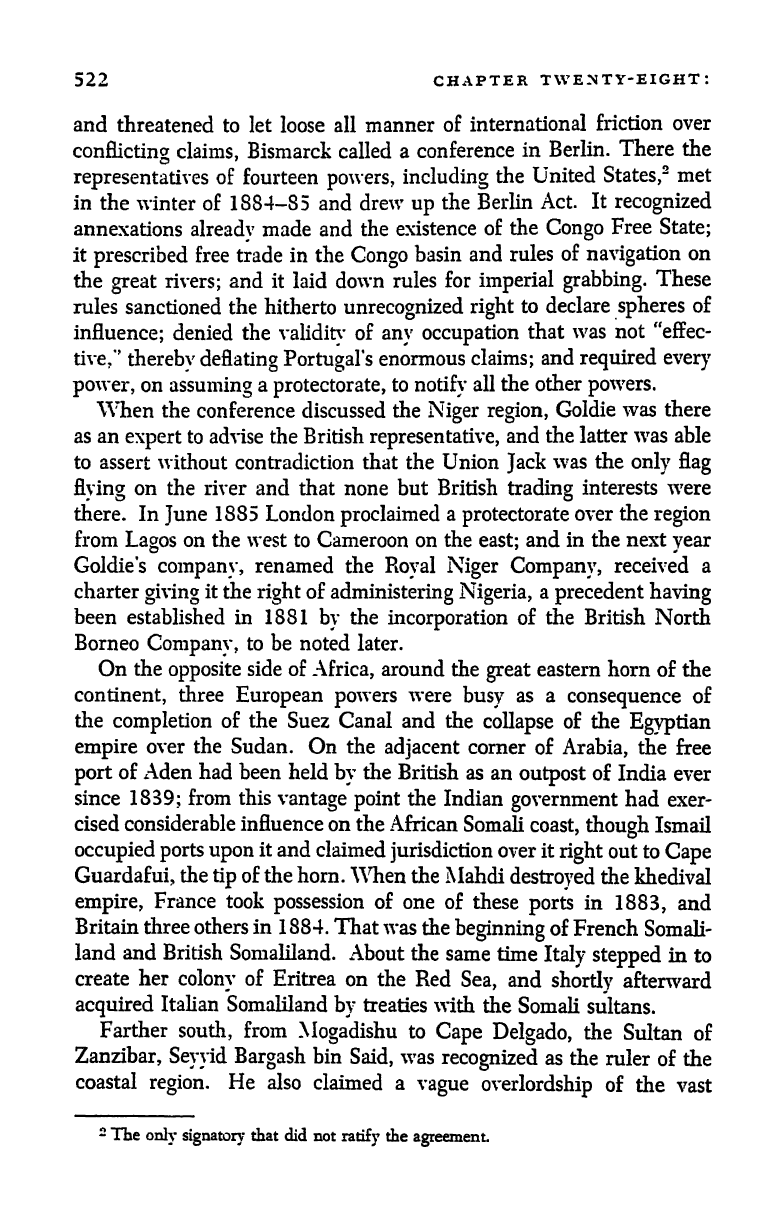
522
CHAPTER
TWENTY-EIGHT:
and
threatened to
let
loose
all
manner
of
international
friction
over
conflicting
claims,
Bismarck called
a
conference
in
Berlin.
There
the
representatives
of
fourteen
powers,
including
the
United
States,
2
met
in
the
winter
of
1884-85 and drew
up
the Berlin
Act. It
recognized
annexations
already
made and
the
existence
of the
Congo
Free
State;
it
prescribed
free trade
in
the
Congo
basin
and rules
of
navigation
on
the
great
rivers;
and it laid down
rules
for
imperial grabbing.
These
rules
sanctioned
the
hitherto
unrecognized
right
to declare
spheres
of
influence;
denied
the
validity
of
any occupation
that
was
not "effec-
tive,"
thereby
deflating Portugal's
enormous
claims;
and
required
every
power,
on
assuming
a
protectorate,
to
notify
all the
other
powers.
When
the
conference discussed the
Niger
region,
Goldie
was
there
as
an
expert
to
advise the British
representative,
and
the
latter
was able
to
assert
without contradiction
that
the Union
Jack
was the
only
flag
flying
on
the
river and that
none
but British
trading
interests were
there. In
June
1885
London
proclaimed
a
protectorate
over
the
region
from
Lagos
on the west
to Cameroon
on the
east;
and
in the
next
year
Goldie
's
company,
renamed
the
Royal
Niger
Company,
received
a
charter
giving
it
the
right
of
administering
Nigeria,
a
precedent
having
been
established
in 1881
by
the
incorporation
of
the British
North
Borneo
Company,
to be noted later.
On
the
opposite
side of
Africa,
around the
great
eastern
horn
of the
continent,
three
European powers
were
busy
as a
consequence
of
the
completion
of the
Suez Canal and
the
collapse
of the
Egyptian
empire
over the Sudan.
On the
adjacent
corner
of
Arabia,
the
free
port
of Aden had been
held
by
the
British
as
an
outpost
of
India
ever
since
1839;
from
this
vantage
point
the Indian
government
had
exer-
cised considerable
influence
on
the African
Somali
coast,
though
Ismail
occupied
ports
upon
it
and
claimed
jurisdiction
over
it
right
out
to
Cape
Guardafui,
the
tip
of
the
horn.
\Yhen the
Mahdi
destroyed
the
khedival
empire,
France
took
possession
of one
of these
ports
in
1883,
and
Britain three
others
in
1 884.
That
was
the
beginning
of French
Somali-
land
and British
Somaliland.
About
the
same
time
Italy
stepped
in
to
create
her
colony
of Eritrea
on the
Red
Sea,
and
shortly
afterward
acquired
Italian
Somaliland
by
treaties
with
the
Somali
sultans.
Farther
south,
from
Mogadishu
to
Cape
Delgado,
the
Sultan of
Zanzibar,
Seyyid
Bargash
bin
Said,
was
recognized
as
the
ruler
of the
coastal
region.
He
also
claimed
a
vague
overlordship
of
the
vast
2
The
only
signatory
that did
not
ratify
the
agreement.
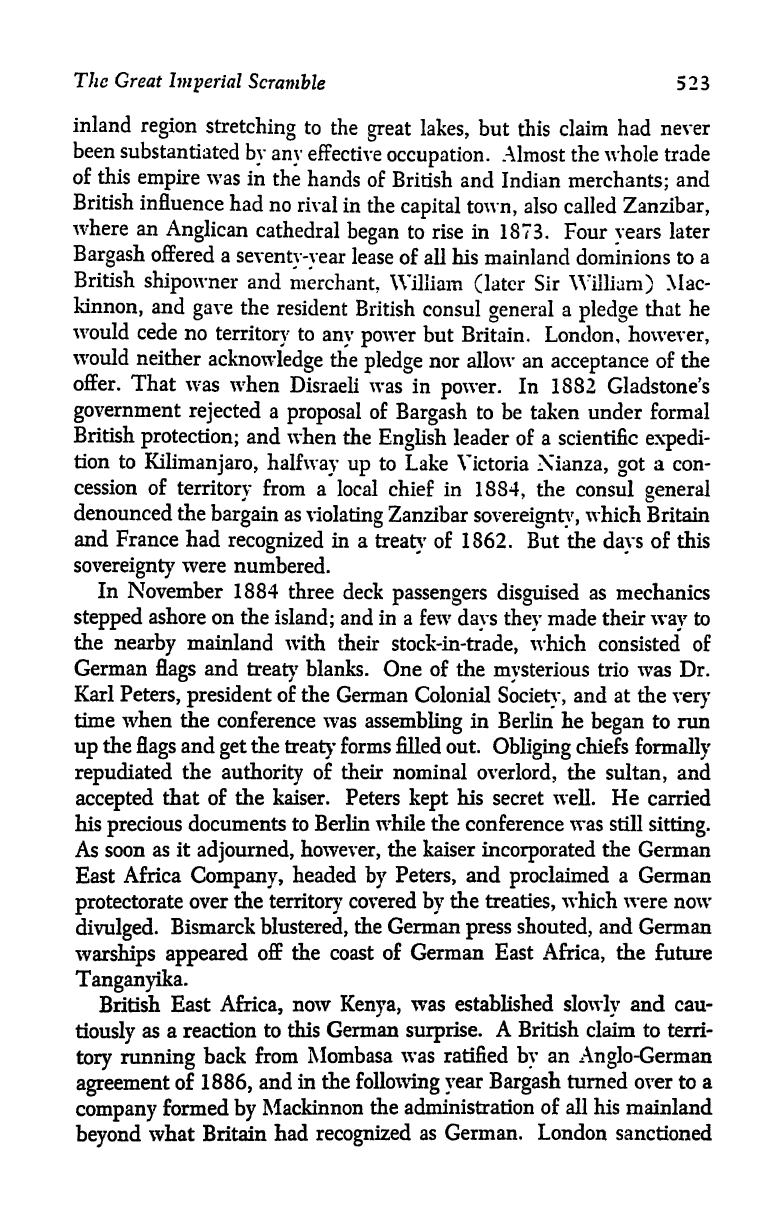
The
Great
Imperial
Scramble
523
inland
region
stretching
to
the
great
lakes,
but
this claim
had
never
been
substantiated
by
any
effective
occupation.
Almost
the
whole
trade
of
this
empire
was
in
the
hands
of
British
and Indian
merchants;
and
British
influence
had no
rival in
the
capital
town,
also
called
Zanzibar,
where an
Anglican
cathedral
began
to
rise in
1873. Four
years
later
Bargash
offered
a
seventy-year
lease
of all
his
mainland
dominions
to
a
British
shipowner
and
merchant,
William
(later
Sir
William)
Mac-
kinnon,
and
gave
the
resident
British consul
general
a
pledge
that
he
would
cede
no
territory
to
any power
but Britain.
London,
however,
would
neither
acknowledge
the
pledge
nor allow an
acceptance
of the
offer.
That
was when
Disraeli was
in
power.
In 1882 Gladstone's
government
rejected
a
proposal
of
Bargash
to
be
taken
under
formal
British
protection;
and
when
the
English
leader
of
a scientific
expedi-
tion to
Kilimanjaro,
halfway up
to Lake Victoria
Xianza,
got
a
con-
cession of
territory
from
a
local
chief
in
1884,
the consul
general
denounced the
bargain
as
violating
Zanzibar
sovereignty,
which Britain
and France
had
recognized
in a
treat}'
of 1862.
But the
days
of
this
sovereignty
were
numbered.
In
November 1884
three deck
passengers disguised
as mechanics
stepped
ashore on the
island;
and
in a
few
days
they
made their
way
to
the
nearby
mainland
with
their
stock-in-trade,
which
consisted
of
German
flags
and
treaty
blanks.
One
of
the
mysterious
trio was Dr.
Karl
Peters,
president
of the
German
Colonial
Society,
and
at
the
very
time
when the
conference
was
assembling
in
Berlin he
began
to
run
up
the
flags
and
get
the
treaty-
forms
filled out.
Obliging
chiefs
formally
repudiated
the
authority
of
their
nominal
overlord,
the
sultan,
and
accepted
that of the kaiser. Peters
kept
his secret
well.
He
carried
his
precious
documents to Berlin while
the
conference was still
sitting.
As
soon
as it
adjourned,
however,
the kaiser
incorporated
the
German
East
Africa
Company,
headed
by
Peters,
and
proclaimed
a
German
protectorate
over the
territory
covered
by
the
treaties,
which were now
divulged.
Bismarck
blustered,
the German
press
shouted,
and
German
warships appeared
off
the coast
of
German
East
Africa,
the
future
Tanganyika.
British
East
Africa,
now
Kenya,
was established
slowly
and
cau-
tiously
as
a reaction to
this German
surprise.
A
British
claim to
terri-
tory
running
back
from
Mombasa
was ratified
by
an
Anglo-German
agreement
of
1886,
and
in the
following
year
Bargash
turned
over to
a
company
formed
by
Mackinnon
the
administration
of all his
mainland
beyond
what
Britain
had
recognized
as
German. London sanctioned
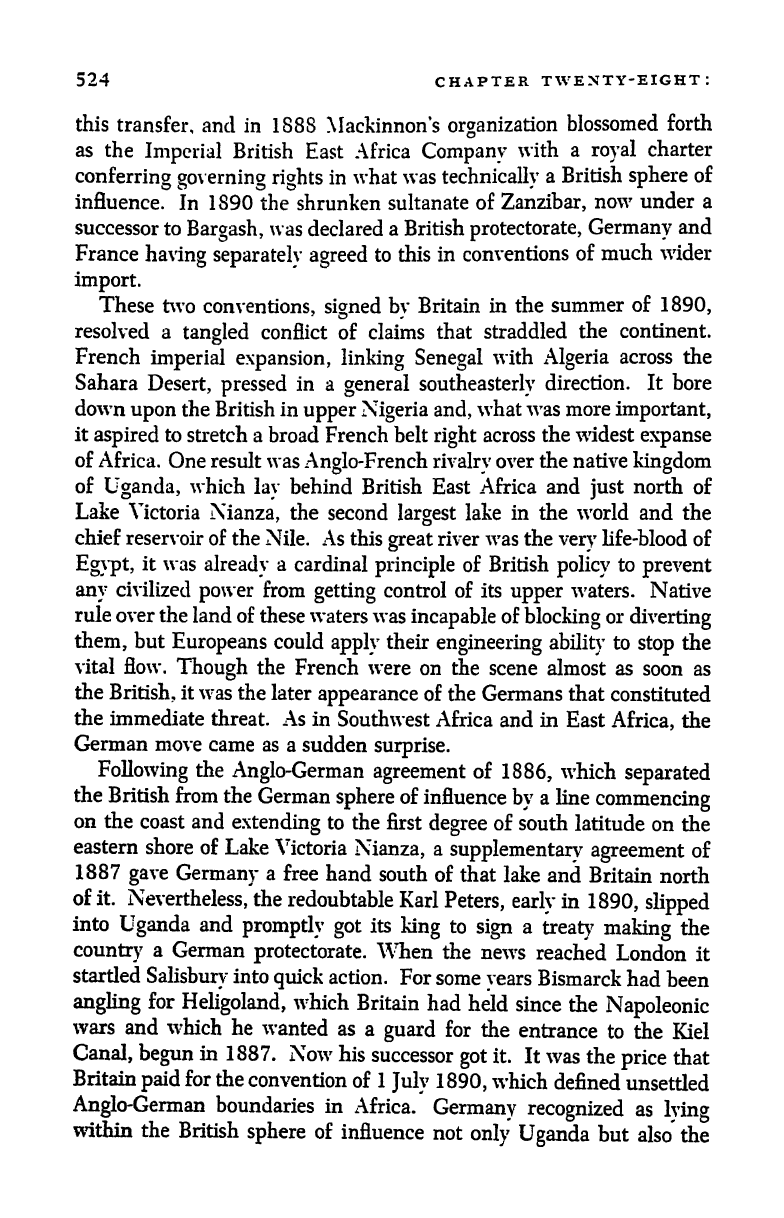
524
CHAPTER
TWENTY-EIGHT:
this
transfer,
and in
1888 Mackinnon's
organization
blossomed
forth
as
the
Imperial
British
East
Africa
Company
with
a
royal
charter
conferring
governing
rights
in what
was
technically
a
British
sphere
of
influence.
In
1890
the shrunken
sultanate
of
Zanzibar,
now under a
successor to
Bargash,
was declared
a British
protectorate,
Germany
and
France
having separately
agreed
to this
in conventions
of
much
wider
import.
These
two
conventions,
signed
by
Britain
in
the
summer
of
1890,
resolved a
tangled
conflict of
claims
that
straddled
the
continent.
French
imperial
expansion,
linking
Senegal
with
Algeria
across
the
Sahara
Desert,
pressed
in a
general
southeasterly
direction. It bore
down
upon
the British in
upper
Nigeria
and,
what
was more
important,
it
aspired
to
stretch a
broad
French belt
right
across
the
widest
expanse
of
Africa.
One
result was
Anglo-French
rivalry
over the
native
kingdom
of
Uganda,
which
lay
behind
British
East
Africa and
just
north of
Lake
Victoria
Nianza,
the
second
largest
lake
in the world and
the
chief reservoir
of the
Nile. As this
great
river
was the
very
life-blood of
Egypt,
it
was
already
a
cardinal
principle
of
British
policy
to
prevent
any
civilized
power
from
getting
control
of
its
upper
waters.
Native
rule
over the
land
of
these
waters
was
incapable
of
blocking
or
diverting
them,
but
Europeans
could
apply
their
engineering ability
to
stop
the
vital flow.
Though
the
French were on
the
scene
almost
as
soon as
the
British,
it
was
the later
appearance
of the
Germans that
constituted
the
immediate
threat.
As
in
Southwest
Africa
and in
East
Africa,
the
German
move
came as
a
sudden
surprise.
Following
the
Anglo-German
agreement
of
1886,
which
separated
the
British
from the
German
sphere
of
influence
by
a
line
commencing
on
the
coast
and
extending
to
the
first
degree
of
south
latitude on
the
eastern
shore
of Lake
Victoria
Nianza,
a
supplementary
agreement
of
1887
gave
Germany
a
free
hand south
of that
lake
and
Britain
north
of
it.
Nevertheless,
the
redoubtable
Karl
Peters,
early
in
1890,
slipped
into
Uganda
and
promptly
got
its
king
to
sign
a
treaty
making
the
country
a
German
protectorate.
When
the
news
reached
London it
startled
Salisbury
into
quick
action.
For
some
years
Bismarck
had
been
angling
for
Heligoland,
which
Britain
had
held
since
the
Napoleonic
wars
and
which he
wanted as
a
guard
for
the
entrance
to
the
Kiel
Canal,
begun
in
1887.
Now
his
successor
got
it.
It
was
the
price
that
Britain
paid
for
the
convention
of
1
July
1890,
which
defined
unsettled
Anglo-German
boundaries
in
Africa.
Germany
recognized
as
lvin<*
within the
British
sphere
of
influence
not
only
Uganda
but
also
the
